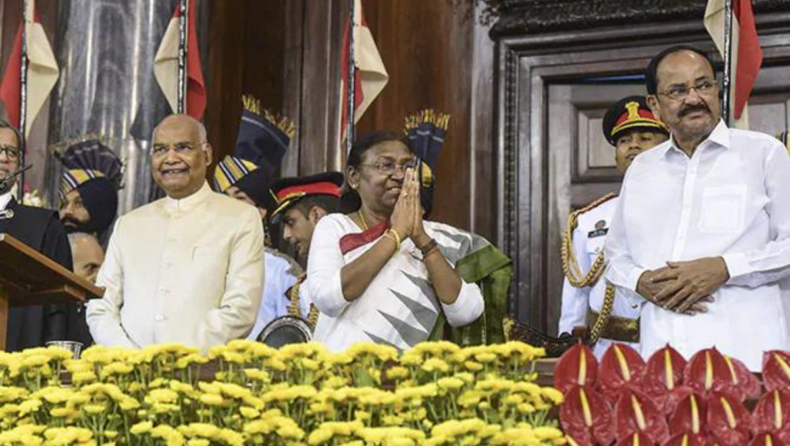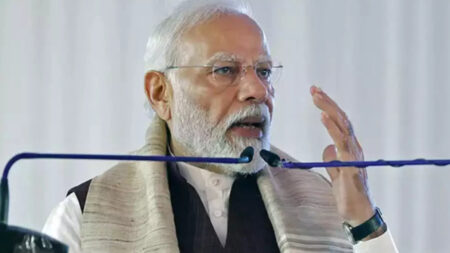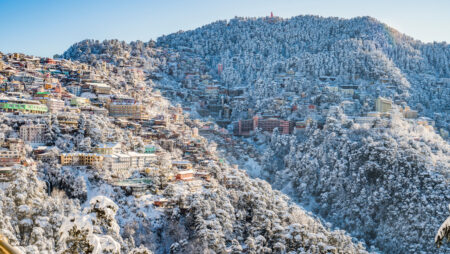As the 15th president of India, Droupadi Murmu was sworn in on Monday, culminating an incredible journey from Rairangpur to Raisina Hills. The oath of office was delivered to Murmu, 64, the youngest president to date and the first to be born in independent India, in the Central Hall of Parliament by Chief Justice of India N V Ramana.

A poor woman’s ability to dream and ascend to hold the highest institutional position of the Indian republic, according to Murmu, was made possible by Indian democracy, not by her election as president of India, she remarked in her inaugural speech. She wore a traditional Santhali saree in three colours to show off her tribal heritage.
“India’s democracy is demonstrated by the fact that a girl from a low-income tribal household was elected to the highest constitutional post. I did not win the presidency as a result of any personal achievement. Each and every poor Indian has achieved it. My victory in the election shows that even the most impoverished Indians are capable of having aspirations and achieving them.” Droupadi Murmu said in a speech in flawless Hindi despite not speaking it as her first language.
Droupadi Murmu stated that she wants to reassure all Indians, particularly the young and women, that as president, she will put their interests first. Before taking office as governor of Jharkhand, Murmu began her career in government as a councillor in Rairangpur. President Murmu vowed to uphold the Indian Constitution and referenced the Odia poet Bhima Bhoi who prayed to Lord Jagannath and said that even if one must endure the most suffering for it, the welfare of the world is essential. The Central Hall, which was crammed with luminaries including Prime Minister Narendra Modi, the Union Cabinet, MPs, chief ministers, and former President Pratibha Patil, was where President Murmu addressed. He spoke about a range of subjects, including sustainable development, tribal groups, and the government’s Digital India initiative.
In the village where President Murmu was reared, a little girl acquiring an elementary education was still a distant dream. In one of India’s least developed regions, Mayurbhanj, President Murmu was born into the Santhal family. She surmounted all obstacles, nonetheless, and enrolled in college first in her community.
“Those who have endured poverty for ages recognise themselves in me.” She said, “It is a matter of immense satisfaction for me that the poor, downtrodden, backward, and tribal people find themselves represented in me. Generation after generation has deprived them and denied them the benefits of development.
Aware of the presidential legacy she would now carry forward, Murmu vowed that she would always be motivated by the democratic cultural ideals of India and all of its citizens. She recalled India’s war for independence, which served as the impetus for the country’s new national development. She recognised the achievements of Chandrashekhar Azad, Bhagat Singh, Sukhdev, Rajguru, Netaji Subhas Chandra Bose, Jawaharlal Nehru, Sardar Patel, Netaji Subhas Chandra Bose, and Jawaharlal Nehru on the one hand, and women figures like Rani Lakshmi Bai and Rani Velu Nach on the other.
“I was up in a tribe that has a long tradition of peacefully interacting with the natural world. I’ve learned to appreciate the importance of forests and waterways in my life. By utilising its resources and contributing to it, we show our appreciation for nature. Now everyone needs to be sensitive to this “She said.
Murmu was brought by the Presidential Guard to Rashtrapati Bhavan after being sworn in so she could see the ceremonial Guard of Honor made up of the three services. Before moving to their new home at 12 Janpath, Kovind and his family had a formal goodbye from the incoming Commander-in-Chief of the Armed Forces.













